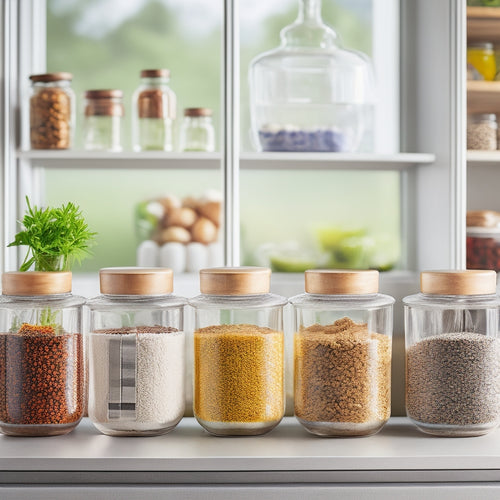
Food Storage Mistakes: Tips for Freshness
Share
Proper food storage is essential for maintaining freshness, quality, and safety, yet many common mistakes can lead to spoilage, wastage, and even foodborne illnesses. Avoid storing oils near heat sources, separate potatoes and onions, and dry produce thoroughly before refrigeration to prevent degradation. Store canned foods in a cool, dry place, rotate them regularly, and cover leftovers securely to prevent cross-contamination. By following these important tips, you can greatly extend the shelf life of your food and guarantee it remains fresh and safe to consume. Discover more strategies to optimize your food storage habits and enjoy a fresher, healthier diet.
Key Takeaways
• Avoid storing oils near heat sources to prevent degradation and maintain quality and shelf life.
• Store potatoes and onions separately to prevent gas release and spoilage.
• Dry produce thoroughly before refrigeration to prevent bacterial growth and spoilage.
• Check expiration dates and store canned food in a cool, dry place to maintain quality and safety.
• Cover leftovers securely with aluminum foil, plastic wrap, or airtight containers to prevent cross-contamination and spoilage.
Oil Storage Mistakes to Avoid
When it comes to storing cooking oils, one common mistake to avoid is keeping them near the stove or oven, as the heat from these appliances can cause the oils to break down faster and develop unpleasant flavors. Proper oil storage is essential to maintaining their quality and shelf life.
Oils can last for months to a year after opening if stored correctly. To avoid oil degradation, keep oils in a cool, dry place with tightly fitted lids. This prevents them from going rancid and guarantees they retain their flavor and nutritional value.
Separating Potatoes and Onions Matters
Because potatoes and onions have different storage requirements and release gases that can affect each other's quality, it is vital to store them separately.
Onions release ethylene gas, which can cause potatoes to spoil, while potatoes' high moisture content can make onions mushy. Storing them together can accelerate their degradation process.
To prevent spoilage, it's critical to find suitable storage solutions for each. Store potatoes in a cool, dry place with good ventilation, and keep onions in a well-ventilated area with low humidity.
The Importance of Dry Produce
Fresh produce, particularly delicate fruits and vegetables, requires careful handling to maintain its quality, and excess moisture is a main culprit in accelerating spoilage. Proper drying is important to prevent moisture from accumulating in the fridge, where it can promote bacterial growth and decay.
When produce is washed before refrigeration, it is necessary to dry it thoroughly with a kitchen towel or salad spinner to remove excess moisture. Fridge moisture can quickly lead to spoilage, making it essential to store produce in a dry environment.
Canned Food Storage Safety Tips
Proper storage of canned goods is fundamental to maintaining their quality and safety, as compromised cans can harbor bacteria and cause foodborne illnesses. To guarantee safety, it's important to check expiration dates and store cans in a cool, dry place.
Proper rotation of cans is also essential, with newer cans placed behind older ones to ensure the oldest items are consumed first. Additionally, avoid storing cans near heat sources, such as ovens or stovetops, as this can cause the contents to degrade faster.
Covering Leftovers for Freshness
In order to prevent cross-contamination and spoilage, it is vital to cover leftovers securely before refrigerating or freezing them. This helps to prevent the growth of bacteria and mold, which can cause foodborne illnesses. Proper wrapping is important in maintaining freshness.
| Wrapping Method | Advantages | Disadvantages |
|---|---|---|
| Aluminum Foil | Inexpensive, easy to use | Can react with acidic foods |
| Plastic Wrap | Clings to containers, easy to use | Can trap moisture, causing spoilage |
| Airtight Containers | Prevents moisture and air from entering | More costly than other options |
When refrigerating leftovers, make sure to label them with the date they were cooked and consume them within 3 to 4 days. For longer storage, consider freezing leftovers, which can be safely stored for several months. Always follow safe refrigeration tips to guarantee the freshness and safety of your leftovers.
Frequently Asked Questions
How Often Should I Clean My Fridge to Maintain Food Freshness?
"A sparkling clean fridge is the beacon of freshness, shining brightly in the kitchen. To maintain this radiance, clean your fridge every 1-2 months, ensuring organization and maintenance of cleanliness, thereby safeguarding food freshness and safety."
What's the Best Way to Label Leftovers for Easy Identification?
To facilitate easy identification and prevent cross-contamination, label leftovers with the date, contents, and reheating instructions using a permanent marker or label maker, and organize them in a designated area of the fridge for best food safety.
Can I Store Food in Plastic Bags Instead of Containers?
Can plastic bags replace containers for food storage? While convenient, plastic bags compromise freshness and organization. Without labeling, contents are left to mystery, and freshness suffers. Choose airtight containers with clear labeling for best food safety and storage.
How Long Does It Take for Food to Spoil in the Fridge?
Proper refrigerator organization and awareness of food expiration indicators, such as unusual odors, slimy texture, and mold growth, are essential to ensuring food safety and preventing spoilage, which can occur within 3-7 days for perishable items.
What's the Ideal Refrigerator Temperature for Food Storage?
For best food safety, the ideal refrigerator temperature for storage is between 37°F and 40°F (3°C and 4°C), ensuring proper temperature control to prevent bacterial growth and maintain freshness.
Related Posts
-

Under-Sink Storage Tips for Minimalist Kitchens
To maximize under-sink storage in your minimalist kitchen, start by utilizing vertical space with shelf risers and st...
-

Sink Caddy Organizers for Farmhouse Style Kitchens
Sink caddy organizers are perfect for elevating your farmhouse-style kitchen while keeping it functional. You'll love...
-

Stackable Kitchen Containers for Dry Goods
Stackable kitchen containers are perfect for organizing dry goods and maximizing your kitchen space. They help reduce...


